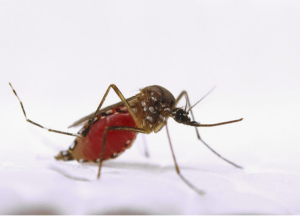Does your blood type make mosquitoes bite you more? Yes, it seems so.
It turns out that our blood type probably plays a role in determining whether or not we are attractive to one of the most infamous pests on the planet: mosquitoes. These tiny, blood-sucking insects are known for their persistence and ability to ruin outdoor activities, but recent research suggests that certain blood types may make individuals more or less likely to be targeted by mosquitoes. In this piece, we’ll explore what we know about mosquito preferences and blood type, and what it might mean for those of us who are all too familiar with the itch and annoyance of a mosquito bite.
Blood Type O and Mosquitoes
Let’s get right to the punch line: People with O-type blood might attract more mosquito bites than other people.
Mosquitoes are notorious for their ability to seek out and feed on human blood, leaving us with itchy welts and the potential for disease transmission. While it may seem like these pests are indiscriminate in their choice of prey, recent studies have shown that certain blood types are more attractive to mosquitoes than others. Specifically, individuals with Type O blood are thought to be more susceptible to mosquito bites than those with other blood types. This may be due to the fact that Type O blood is more likely to contain certain chemical compounds that mosquitoes find appealing, such as lactic acid and ammonia.
Blood Types and Mosquitoes, Backed Up by Research
There have been a number of studies over the years that have explored the relationship between blood type and mosquito attraction. Here are some of the more notable ones we relied on for this piece:
- In a study published in the Journal of Medical Entomology in 2004, researchers found that mosquitoes were significantly more likely to land on and feed from people with Type O blood than from those with Type A, Type B, or Type AB blood. The researchers hypothesized that this may be due to the fact that Type O blood contains higher levels of certain chemicals, such as lactic acid and ammonia, that mosquitoes find attractive.
- A more recent study, published in the journal PLOS ONE in 2019, found that mosquitoes were not only more attracted to people with Type O blood, but also that they fed more frequently and for longer periods of time on these individuals. The researchers used a device called a “mosquito feeding assay” to measure the amount of time mosquitoes spent feeding on blood from different blood types, and found that mosquitoes fed for an average of 8.4 minutes on Type O blood, compared to 6.4 minutes on Type A blood and 4.5 minutes on Type B blood.
While these studies provide some evidence to support the idea that mosquitoes prefer blood type O, it’s worth noting that the relationship between blood type and mosquito preferences is still not fully understood. As with so many things related to mosquitoes and other vectors, our understanding of it all is evolving, but so are the mosquitoes!
Other Blood Types and Mosquitoes
While many studies have suggested that mosquitoes are more attracted to people with Type O blood, there is also evidence to suggest that other blood types may be more or less attractive to these pesky insects.
For example, a study published in the Journal of the American Mosquito Control Association in 2011 found that mosquitoes were more attracted to people with Type B blood. The researchers used a device called a “mosquito landing count” to measure the number of mosquitoes that landed on different individuals, and found that people with Type B blood attracted more mosquitoes as those with Type O or Type A blood.
Another study, published in the Journal of Medical Entomology in 2018, found that mosquitoes were more attracted to people with Type A blood than to those with Type B or Type AB blood. The researchers used a device called a “skin odor meter” to measure the amount of odor emitted by different individuals, and found that people with Type A blood had higher levels of certain chemicals that mosquitoes find attractive.
The varied findings suggest that the relationship between blood type and mosquito preferences may be more complex than previously thought. While Type O blood may be more attractive to mosquitoes in some situations, other factors, such as genetics and body chemistry, may also play a role in determining who these insects are drawn to.
Regardless of your blood type, it’s important to take steps to protect yourself from mosquito bites. Take steps like wearing long-sleeved bug clothing, using insect repellent, and avoiding outdoor activities during peak mosquito hours – dawn and especially dusk.
Things Other Than Blood Type Affect Mosquito Attraction, Too
While blood type seems to play a big role in attracting mosquitoes, it’s not the only factor that determines whether or not you’ll be a target for these pesky insects. Lots of variables can make a difference. Here are some other factors that can make you more or less attractive to mosquitoes:
Body heat
Mosquitoes are attracted to warmth, so people with higher body temperatures are more likely to be targeted. This is why you might notice more mosquito bites after exercising or spending time in the sun. If you are a person who tends to run hot, the mosquitoes will probably find you.
Sweat
Mosquitoes are also attracted to the chemicals in sweat, especially lactic acid. If you’re sweating heavily, you’ll be more attractive to mosquitoes. People who tend to sweat more will probably find themselves swatting more.
Clothing color
Mosquitoes are drawn to darker colors, so wearing light-colored clothing can help make you less visible to these insects. The combination of light colors and longer sleeves can make a big difference in your mosquito impact, so consider some of the mosquito shirts we recommend for your outdoor activities like gardening.
Carbon dioxide
Mosquitoes are able to detect the carbon dioxide that we exhale, so people who breathe more heavily or have a higher metabolic rate may be more attractive to mosquitoes. In fact, part of how mosquito repellent works is by confusing the mosquitoes’ ability to detect our carbon dioxide.
Genetics
Studies have shown that certain genetic factors can make some people more attractive to mosquitoes than others. For example, people with a specific gene mutation that affects their body odor may be less likely to be bitten. I’m not a geneticist so won’t try to explain it here!
Pregnancy
Pregnant women are more attractive to mosquitoes, likely due to the increase in body heat and carbon dioxide that occurs during pregnancy.
Sources:






